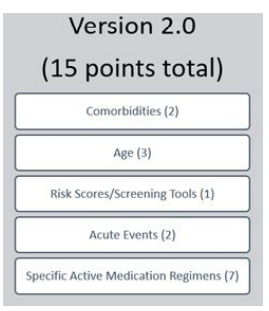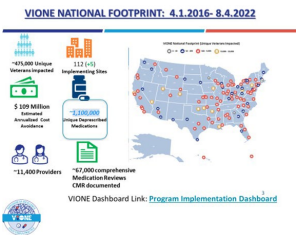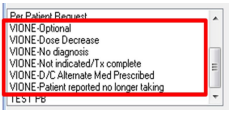CHALLENGE
Many patients take too many medications, many of which were prescribed long ago, without attempts to decrease or stop them, or exploring benefits versus harm for continuing.
In addition, patients often do not adhere to medication schedules due to side effects, compromised abilities to manage medication schedules, confusion, or cost.
A holistic approach is efficient to continuously and continually:
• Make medications work for patients and not against them
• Identify potentially inappropriate medications (PIM)
• Intervene as needed.
INNOVATION
VIONE is a methodology to reduce polypharmacy by identifying and discontinuing unnecessary, ineffective, and inappropriate medications that do more to harm or burden patients than to help them.
VIONE is part of the veterans affairs (VA’s) electronic health records (EHR). It can be used across any patient care setting, including hospitals, homes, rural areas, outpatient facilities, and virtual health modalities such as telehealth.
Medical providers and pharmacists can deprescribe PIM, while engaging patients, surrogate decision makers,and other health care professionals using these 5 filters: (Figure 1), utilizing VIONE score card (Figure 2), leading to current national footprint (Figure 3).
Figure 1. Five Desprescribing VIONE Filters

Source. Battar et al2
Figure 2. VIONE Score Card

Figure 3. VIONE National Footprint:

Source. Battar et al2
Deprescribe (verb): Intentionally stop a medication or reduce its dose to improve outcomes and reduce the risk of adverse, undesirable side effects.
VIONE is not a substitute for careful clinical consideration. It prompts attention to non-pharmaceutical, whole health approaches in simple and practical ways with proactive deprescribing practices (Table 1).
Table 1. Medication Reconciliation vs VIONE
|
Medication Reconciliation
|
VIONE
|
| A list of prescribed medications, herbal products, and OTC medications taken by the Veteran. |
A simple electronic tool that focuses on whether a Veteran should or should not be taking a medication on their current medication list. |
| GOAL: Confirm and document an accurate and current medication list. |
GOAL: Create a medication regimen that is helpful, not harmful. |
VIONE DASHBOARDS PACT/HBPC|CLC/Inpatient: Upcoming APPOINTMENT
Awards: VHA USH Shark Tank competition, Gears of Government, High Reliability Organization (HRO) (Figure 4).
Figure 4. VIONE Awards Received Include Below

HOW VIONEWORKS IN ELECTRONIC HEALTH RECORDS
• Review Medications – select VIONE deprescribing filters for each medication. Figure 5 VIONE filters in Electronic Health Records
• In CPRS, click on:
• Medication
• Actions
• Discontinue – drop down menu
• Choose VIONE reasons to discontinue
• Discuss with patient and/or surrogate decision-maker
• Make deprescribing decisions based on clinical review and the best interests of the patient.
• Collaborating pharmacist and/or providers add each other as cosigners
• Data is automatically captured every day when VIONE options are selected and/or VIONE note template is utilized for deprescribing medications.
Figure 5. How VIONE works in Electronic Health Records











